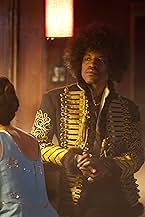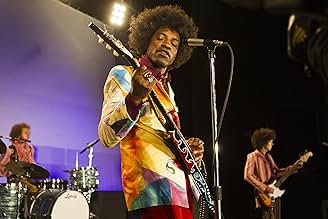CALIFICACIÓN DE IMDb
5.7/10
7.2 k
TU CALIFICACIÓN
Muestra la vida de Jimi Hendrix cuando se mudó de Nueva York a Londres, donde su carrera despegó.Muestra la vida de Jimi Hendrix cuando se mudó de Nueva York a Londres, donde su carrera despegó.Muestra la vida de Jimi Hendrix cuando se mudó de Nueva York a Londres, donde su carrera despegó.
- Dirección
- Guionista
- Elenco
- Premios
- 1 premio ganado y 10 nominaciones en total
André 3000
- Jimi Hendrix
- (as André Benjamin)
Robbie Jarvis
- Andrew Loog Oldham
- (as Robbie Jarvis-Dean)
Seán Duggan
- Evans
- (as Sean Duggan)
- Dirección
- Guionista
- Todo el elenco y el equipo
- Producción, taquilla y más en IMDbPro
Opiniones destacadas
The theatregoer hoping to get some insight into Jimi Hendrix and London in 1966/67 will leave the theatre disappointed or duped by the film makers.
Before seeing the film I was apprehensive, as I had been told that my character was portrayed in a derogatory and potentially defamatory manner. I had been told that Jimi had beaten me with a telephone in the film and after I had protested that this was not true the film makers had replied that it was true because they had "thoroughly researched" me.
In other words they were saying that they were telling the truth and I was not.
During the opening scenes I found it difficult to comprehend the way the story was unfolding, or what it was depicting. The editing was disjointed and dialogue was layered on top of alternate dialogue, seemingly from a parallel conversation.
The film progressed in a confusing and dull manner but there was one scene that gave me a momentary lift of anticipation. The scene depicts Jimi playing with Cream at the Polytechnic Students' Union and should have set out to depict an absolutely epic event that I had witnessed. (I had been carrying Jimi's guitar).
I hoped that they would do Jimi justice in their interpretation of what happened. Unfortunately, once the music started, my heart sank. What a disappointment. Not only was it insulting to Jimi's legacy, but I would say it was fairly insulting to Eric Clapton as well because the real Eric Clapton would never have been in awe of the unremarkable performance presented to viewers in this film.
The storyline progressed in an awkward and illogical way and was hard to comprehend.
The basis seemed to be that the dimwitted "Jimi" could not make up his mind between the good rock chick (Linda Keith) and the bad rock chick (Kathy Etchingham) who later goes bonkers and takes an overdose. (If I was the actress having to play this lousy part wearing those ugly clothes I may have taken an overdose too.)
The strange fact that jars with this fictional narrative is that, in reality, the unfortunate Linda Keith ended up in rehab at around this time because Keith Richards, of all people, initiated an intervention that probably saved her life. She was hardly in a position to be advising Jimi on how to play the guitar and do his hair.
Fictional characters were introduced that furthered the deluded political, racial and sexist agenda that John Ridley seemed to be pursuing. In particular Michael X was presented as a saintly black political guru whereas in truth he was a violent criminal con man who was executed for a gruesome murder. An "Ida" character is introduced who never existed in real life.
The biggest disappointment of this film was that after expecting at least some kind of depiction of Jimi's humour and creativity and the amusing and creative times that were happening in London, instead we were shown a gloomy and depressing dark tale that pictured Jimi as some sort of moronic mumbling mystic with no ambition.
Instead of showing Jimi touring the UK and Europe, writing and performing the most innovative music of the century we are shown scenes of banal mumblings, fictitious gratuitous violence and fictitious mental breakdowns and overdoses.
My initial anxiety turned to scorn for the thoroughly bad screenplay and direction. I became bored and impatient for the end of the film.
The fictional nature of the film left me feeling that the events I was watching were more akin to a made for DVD movie than a biopic.
I felt that I wasn't watching an interpretation of the real events from the time, but rather a stiff and poorly depicted mashup of trivia from events described in my book, sprinkled over Ridley's racially driven fictional theme.
Even the imaginary domestic violence, mental breakdown and drug use that my character was involved in did not evoke the emotional response I expected, and I found myself feeling just as I have when watching other bad movies, impatient for it to just finish and spare me the indignity of having to watch another tiresome scene with wooden dialogue and disjointed editing.
A short-sighted and somewhat offensive portrayal of Jimi and those around him at the time.
Final verdict: Fictional Movie – 2/10 Biopic purporting to be based in fact – 1/10 (for spelling all the names right)
Before seeing the film I was apprehensive, as I had been told that my character was portrayed in a derogatory and potentially defamatory manner. I had been told that Jimi had beaten me with a telephone in the film and after I had protested that this was not true the film makers had replied that it was true because they had "thoroughly researched" me.
In other words they were saying that they were telling the truth and I was not.
During the opening scenes I found it difficult to comprehend the way the story was unfolding, or what it was depicting. The editing was disjointed and dialogue was layered on top of alternate dialogue, seemingly from a parallel conversation.
The film progressed in a confusing and dull manner but there was one scene that gave me a momentary lift of anticipation. The scene depicts Jimi playing with Cream at the Polytechnic Students' Union and should have set out to depict an absolutely epic event that I had witnessed. (I had been carrying Jimi's guitar).
I hoped that they would do Jimi justice in their interpretation of what happened. Unfortunately, once the music started, my heart sank. What a disappointment. Not only was it insulting to Jimi's legacy, but I would say it was fairly insulting to Eric Clapton as well because the real Eric Clapton would never have been in awe of the unremarkable performance presented to viewers in this film.
The storyline progressed in an awkward and illogical way and was hard to comprehend.
The basis seemed to be that the dimwitted "Jimi" could not make up his mind between the good rock chick (Linda Keith) and the bad rock chick (Kathy Etchingham) who later goes bonkers and takes an overdose. (If I was the actress having to play this lousy part wearing those ugly clothes I may have taken an overdose too.)
The strange fact that jars with this fictional narrative is that, in reality, the unfortunate Linda Keith ended up in rehab at around this time because Keith Richards, of all people, initiated an intervention that probably saved her life. She was hardly in a position to be advising Jimi on how to play the guitar and do his hair.
Fictional characters were introduced that furthered the deluded political, racial and sexist agenda that John Ridley seemed to be pursuing. In particular Michael X was presented as a saintly black political guru whereas in truth he was a violent criminal con man who was executed for a gruesome murder. An "Ida" character is introduced who never existed in real life.
The biggest disappointment of this film was that after expecting at least some kind of depiction of Jimi's humour and creativity and the amusing and creative times that were happening in London, instead we were shown a gloomy and depressing dark tale that pictured Jimi as some sort of moronic mumbling mystic with no ambition.
Instead of showing Jimi touring the UK and Europe, writing and performing the most innovative music of the century we are shown scenes of banal mumblings, fictitious gratuitous violence and fictitious mental breakdowns and overdoses.
My initial anxiety turned to scorn for the thoroughly bad screenplay and direction. I became bored and impatient for the end of the film.
The fictional nature of the film left me feeling that the events I was watching were more akin to a made for DVD movie than a biopic.
I felt that I wasn't watching an interpretation of the real events from the time, but rather a stiff and poorly depicted mashup of trivia from events described in my book, sprinkled over Ridley's racially driven fictional theme.
Even the imaginary domestic violence, mental breakdown and drug use that my character was involved in did not evoke the emotional response I expected, and I found myself feeling just as I have when watching other bad movies, impatient for it to just finish and spare me the indignity of having to watch another tiresome scene with wooden dialogue and disjointed editing.
A short-sighted and somewhat offensive portrayal of Jimi and those around him at the time.
Final verdict: Fictional Movie – 2/10 Biopic purporting to be based in fact – 1/10 (for spelling all the names right)
John Ridley's "Jimi: All Is by My Side" is a worthy effort, but without Jimi Hendrix's music it comes across flat. And as happens with a lot of biopics, there seems to be an emphasis on the unpleasant parts of the subjects life (we can debate the authenticity, although Kathy Etchingham has criticized it). The point is that Jimi Hendrix might not be someone whose life story you can film. At least not without his songs. I'd say that "Purple Haze", "Hey Joe" and Hendrix's riff on "The Star-Spangled Banner" tell more about his life than any movie can. He was the greatest guitarist of all time, and this movie doesn't do him justice.
So remember what he said about the power of love overcoming the love of power.
So remember what he said about the power of love overcoming the love of power.
The dude who said this film is racist doesn't understand Jimmi Hendrix's life. He was a complete unknown drifting from venue to venue under a lot of different monikers only to be discovered by the girlfriend of Keith Richards. That was the era he lived in-- as a black musician in that era coupled with his ridiculous dress, he would have never been given a chance otherwise. If you look into his Harlem show, even black people didn't "get" him. If you're a real Hendrix fan, or have read some of his biographies this film aims to stick true to the actual story of his life--not a politically correct version modified for the 21st century.
And borderline autistic? That's how Hendrix spoke. He was incredibly shy and soft spoken unless he had his guitar in his hand. Watch just about any interview on live television where he was talking one on one with the host--it's awkward and clumsy to the point where you think there's something wrong with him. Add on an intense amount of personal substance abuse and you'll be able to understand why Andre 3000's portrayal of Jimi was spot on.
I'd say if you walk into this film with a little bit of historical understanding of Hendrix's life as well as an awareness about the social pressures shaping the man you'll find this film to be a pretty accurate representation on the guitar god.
And borderline autistic? That's how Hendrix spoke. He was incredibly shy and soft spoken unless he had his guitar in his hand. Watch just about any interview on live television where he was talking one on one with the host--it's awkward and clumsy to the point where you think there's something wrong with him. Add on an intense amount of personal substance abuse and you'll be able to understand why Andre 3000's portrayal of Jimi was spot on.
I'd say if you walk into this film with a little bit of historical understanding of Hendrix's life as well as an awareness about the social pressures shaping the man you'll find this film to be a pretty accurate representation on the guitar god.
Jimi Hendrix portrayed by Andre 3000 was a great performance, but with no music. Jimi is an icon and this movie lacked the love of his sound. C'mon maaan!
@uberificbrownie In fact the women featured as Hendrix' friend and lover have come out publicly to declare the film is very inaccurate in several ways. You can read for yourself on the real Linda E.'s web site. She said that Ridley took bits of events that she wrote about in her autobiography and turned them around to fit his modern-day vision. I think she's right in some ways, certainly if you look at Atwell in the movie she's portrayed as being rather common and juxtaposed against Poots' character who is a posh intellectual/romantic.
You see what he's doing right off; Linda E. is the "old" Jimi who played juke joints with few noticing, Linda K helps him find the new Jimi who will be remembered forever. His process going from a back-up blues man to a legend was very likely a lot more complicated than that, and took more than a few notes from a friend to make him what he became.
But that's the Hollywood formula biopic, it encourages simplification of complexities. And sometimes, unfortunately when it comes to observing African American figures, the script may often have a White hand leading the Black hand along (see also 12 YEARS).
The other thing to note is that Ridley does seem to be a political conservative. They tend to observe black and white (not talking about race) more than grey.
It isn't hard to get things right like Hendrix' tone of voice (yes he was soft spoken) or his clothing and hair. Getting the rest "right" is likely harder.
You see what he's doing right off; Linda E. is the "old" Jimi who played juke joints with few noticing, Linda K helps him find the new Jimi who will be remembered forever. His process going from a back-up blues man to a legend was very likely a lot more complicated than that, and took more than a few notes from a friend to make him what he became.
But that's the Hollywood formula biopic, it encourages simplification of complexities. And sometimes, unfortunately when it comes to observing African American figures, the script may often have a White hand leading the Black hand along (see also 12 YEARS).
The other thing to note is that Ridley does seem to be a political conservative. They tend to observe black and white (not talking about race) more than grey.
It isn't hard to get things right like Hendrix' tone of voice (yes he was soft spoken) or his clothing and hair. Getting the rest "right" is likely harder.
¿Sabías que…?
- TriviaJimi Hendrix's estate refused to grant music rights unless they were allowed full participation in the film's production. For that reason, all of the Hendrix songs in the film are covers. At the time the movie is set, 1966-67, Hendrix had three top 10 singles in the UK ("Hey Joe," "Purple Haze," and "The Wind Cries Mary") and a hit album ("Are You Experienced").
- ErroresKathy Etchingham was never beaten with a telephone, as depicted in one scene. According to the real Kathy Etchingham, it was "completely made up."
- Citas
Jimi Hendrix: When the power of love takes over the love of power, that's when things will change.
- ConexionesReferenced in Film '72: Episode dated 19 November 2014 (2014)
- Bandas sonorasFuture Trip
Performed by Waddy Wachtel
Vocal by Arnold McCuller (as Arnold McCullen)
Written by Ed Dantes
Courtesy of PPX International
Selecciones populares
Inicia sesión para calificar y agrega a la lista de videos para obtener recomendaciones personalizadas
- How long is Jimi: All Is by My Side?Con tecnología de Alexa
Detalles
- Fecha de lanzamiento
- Países de origen
- Sitio oficial
- Idioma
- También se conoce como
- Джимі Гендрікс
- Locaciones de filmación
- Productoras
- Ver más créditos de la compañía en IMDbPro
Taquilla
- Total en EE. UU. y Canadá
- USD 340,911
- Fin de semana de estreno en EE. UU. y Canadá
- USD 97,008
- 28 sep 2014
- Total a nivel mundial
- USD 599,840
- Tiempo de ejecución1 hora 58 minutos
- Color
- Mezcla de sonido
- Relación de aspecto
- 2.35 : 1
Contribuir a esta página
Sugiere una edición o agrega el contenido que falta

Principales brechas de datos
By what name was Jimi: All Is by My Side (2013) officially released in India in English?
Responda



























